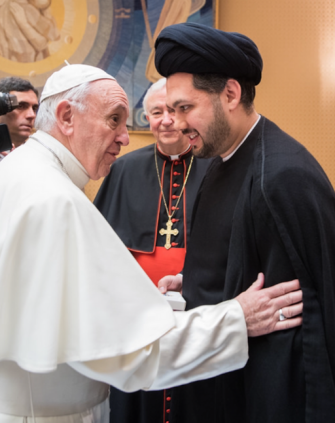Jesus – ‘Isa (3)
Bible
The identity of Jesus as the Son of God is witnessed in the Gospels more by what Jesus does than by what he says about himself. The Gospel of Mark is characterized by what is known as ‘the messianic secret’: the demons recognize who Jesus is, but he tells them to be silent. After the Transfiguration, when Jesus is shown in glory and a voice from heaven declares: “This is my Son, the beloved. Listen to him” Jesus warns the disciples “to tell no one what they had seen, until after the Son of Man had risen from the dead” (Mk 9:9).
In the Synoptic Gospels (Matthew, Mark and Luke) “the Son” used for Jesus is found only three times (Mt 11.27 and the parallel texts; Mt 24:36; Mt 28:19).
In the Gospel of John Jesus speaks of his Sonship 20 times; some examples:
God loved the world so much that he gave his only Son, so that everyone who believes in him may not be lost but may have eternal life (Jn 3:16).
I tell you most solemnly, the Son can do nothing by himself; he can only do what he sees the Father doing: and whatever the Father does the Son does too. For the Father loves the Son and shows him everything he does himself, and he will show him even greater things than these, works that will astonish you. Thus, as the Father raises the dead and gives them life, so the Son gives life to anyone he chooses; for the Father judges no one; he has entrusted all judgement to the Son, so that all my honour the Son as they honour the Father.
(Jn 5:19-23)
See also the Letter of Paul to the Philippians 2:6-11, and the Letter to the Colossians 1:15-20.
Qur’an
Belief in the Incarnation, that the Son of God has become man, is the main difference between Christianity and Islam. All the other differences flow from this source. It is not surprising, then, that there should be numerous passages in the Qur’an which deny that Jesus is the Son of God.
[This is] a statement of the Truth about which they are in doubt: it would not befit God to have a child. He is far above that: when He decrees something, He says only ‘Be’ and it is. “God is my Lord and your Lord, so serve Him: that is a straight path.” But factions have differed among themselves (Q 19:34-37).
Some observations: God is not like the male and female divinities of the pantheon who have sexual relations to beget children. God is obviously above this. But this is not how Christians understand the generation of the Son of God. A little further in the same sura it says:
They [the Christians] attribute offspring to the Lord of Mercy. It does not befit the Lord of Mercy [to have offspring] (Q 19:91-92).
Yet there is a mysterious verse addressed elsewhere to Muhammad:
Say [Prophet], If the Lord of Mercy [truly] had a son, I would be the first to worship him (Q 43:81 - this translation is given in note by Abdel Haleem).
One could say Allâhu akbar, ‘God is greater’ [than anything we could imagine]. John affirms that “God is love” (First Letter of John 4:8) and he continues:
God’s love for us was revealed when god sent into the world his only Son so that we could have life through him (1 Jn 4:9).
It is nevertheless salutary for Christians to remark in surat Maryam (Q 19) the reference to the ‘doubt’ of Christians and that they form ‘factions’. The division among Christians is in fact a scandal.
People of the Book, do not go to excess in your religion, and do not say anything about God except the truth: the Messiah, Jesus, son of Mary, was nothing more than a messenger of God, His Word directed to Mary, and a spirit from Him. So believe in God and His messengers and do not speak of a ‘Trinity’ – stop [this], that is better for you – God is only one God, He is far above having a son, everything in the heavens on earth belongs to Him and He is the best one to trust.
(Q 4:171)
Again some observations: Christians (together with Jews) are called ‘People of the Book’; this is not really appropriate for Christians who are followers of the person of Jesus Christ rather than adherent to a text.
The Trinity is a real stumbling block for Muslims, but it is perhaps up to Christians to show that belief in the Trinity does not prevent them from being true monotheists.









Make A Comment
Comments (0)